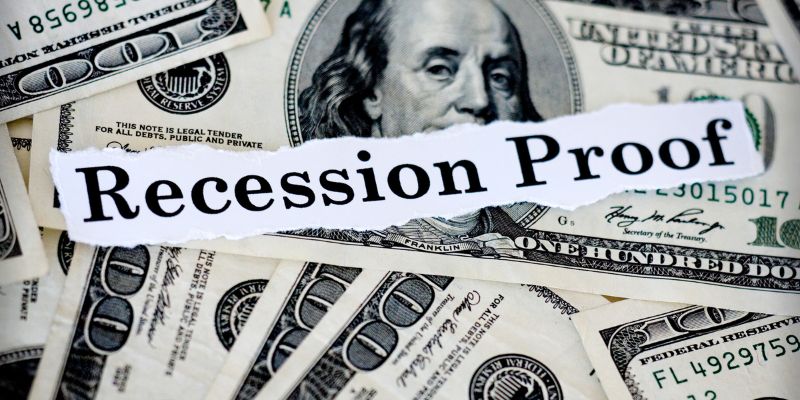Secure Your Investments: A Simple Guide to Recession-Proof Stocks and Industries
Jan 15, 2024 By Triston Martin
If you are looking to invest in the stock market, then it is very important to know about stocks and industries that can withstand economic recessions. This concept, known as investing in "recession-proof" stocks and industries, helps in gaining financial stability even in the hardest times. Especially When the economic conditions are unpredictable, learning about the best recession-proof stocks and industries can save investors from huge losses.
Whether it's the best stocks to buy during a market crash or understanding which industries thrived during past recessions, for example, the companies that grew during the 2008 recession, this article serves as your guide to understanding the always unpredictable and ever-changing stock market.
Understanding Economic Recessions
A recession is typically defined as a significant decline in economic activity across the economy, lasting more than a few months. This downturn is usually visible in real GDP, real income, employment, and industrial production. Recessions impact investments and the stock market significantly. During a recession, the stock market generally experiences a sharp decline. However, historical trends show that stock prices often start to recover before the recession ends. Not all stocks respond equally to economic downturns; some, like consumer staples and utilities, may offer more stability due to their higher dividend yields and essential nature.
Why Some Stocks Are Considered Recession-Proof?
Recession-proof stocks typically possess characteristics that allow them to remain stable or even perform well during economic downturns. These stocks often belong to sectors providing essential services or products that people need regardless of the economic climate. For example, healthcare companies, such as pharmaceutical firms or healthcare providers, continue to see demand as people cannot defer medical needs. Similarly, utility companies providing essential services like electricity and gas maintain stable demand.
Consumer behavior also shifts when they come across stocks hit hardest by recession. At this time, they try to find low-cost retailers who can offer budget-friendly options. Understanding these dynamics is key for investors looking for stocks that are less impacted by economic contractions and can offer relative stability during challenging times.
Key Recession-Proof Industries
 Here are the best recession-proof stocks and industries that you may like to consider for future investment.
Here are the best recession-proof stocks and industries that you may like to consider for future investment.
Consumer Staples: During economic downturns, consumer staples remain in steady demand. These are everyday goods like food, beverages, and household items that people continue to buy regardless of their financial situation. This resilience is partly due to the essential nature of these products, making the consumer staples sector one of the best recession-proof stocks and industries. Even when funds are tight, people still need to purchase these daily necessities, ensuring a consistent revenue stream for companies in this sector.
Healthcare: The healthcare industry is another sector that typically withstands recessions well. The continuous need for medical services, regardless of the economic climate, keeps this industry stable. People cannot defer healthcare, especially in critical situations, making healthcare providers, pharmaceuticals, and related services crucial and recession resistant. An aging population and the constant development of medical technologies also bolster this sector's stability.
Utilities: Utilities include daily life essentials like water, electricity, and gas. They are the essential services whose demand remains the same during economic slumps. It is due to this reason that these services make the utility sector a haven for investors even in the hardest economical times. People prioritize paying for these basic services over other discretionary spending.
Other Potential Sectors: Sectors like education and government services often experience less impact during recessions. Educational institutions, especially those providing essential training and skill development, maintain steady demand. Similarly, government services, due to their critical nature and funding mechanisms, tend to be more insulated from economic fluctuations.
Investment Strategies for Recession Times
During a recession, savvy investment strategies are key to preserving and potentially growing your wealth. Diversifying your portfolio is essential; it involves spreading investments across various asset classes to mitigate risks. This can include a mix of stocks, bonds, and cash equivalents. Stocks in recession-resistant industries like healthcare, consumer staples, and utilities are often wise choices. These sectors typically offer essential services that maintain demand even in tough economic times. Paying attention to companies with solid financials is crucial. It is better to find businesses that have strong balance sheets, low debt, and consistent cash flows. Such businesses have better prospects in the economic recession.
Dividend stocks provide regular income. They are popular and well-established. Before considering these stocks, make sure to verify their dividends. It is necessary that these dividends are sustainable.
Spotlight on Emerging Resilient Industries
 Emerging markets show resistance against global economic challenges. Sectors like tourism, which were badly affected during the pandemic, are now showing signs of growth and development. Furthermore, industries in regions with proactive monetary policies, such as Latin America and those benefiting from elevated commodity prices, are demonstrating strong economic fortitude.
Emerging markets show resistance against global economic challenges. Sectors like tourism, which were badly affected during the pandemic, are now showing signs of growth and development. Furthermore, industries in regions with proactive monetary policies, such as Latin America and those benefiting from elevated commodity prices, are demonstrating strong economic fortitude.
Staying updated with these trends is crucial for investors, as these sectors can offer new opportunities during downturns. Understanding how different markets and industries react to economic pressures helps in identifying potential recession-resistant investments and diversifying portfolios effectively.
Real-Life Success Stories
During past recessions, many companies and industries grew. For example, the healthcare and consumer staples sectors were resilient enough. Therefore, they had stable revenues and profits when as compared to several other sectors that were struggling at that time. Companies like O'Reilly Automotive were in high demand even during recessions.
The reason was that the consumers were happy with vehicle maintenance more than getting a new vehicle. These success stories show the importance of investing in industries offering essential services or products that had high demand despite economic conditions.
Conclusion
It is important to understand which stocks and industries are recession-proof. Sectors like healthcare, utilities, and consumer staples are safe in this context. In addition to this, the current market trends are adaptive to economic downturns. Therefore, they offer better investment opportunities. It is important to remember that investment is never fully safe. The investors must always be ready and prepared for any kind of situation. It is important to have the necessary information to face the uncertainties of the market, even in the hardest times.

Ally Bank vs. Capital One 360: Which Banking Option Is Best for You?
If you're deciding between Ally Bank and Capital One 360, discover the best banking option for you in this guide. Compare features and benefits to make an informed choice!
Feb 08, 2024 Susan Kelly

How long must the policy's beneficiary wait to file a claim?
How long does a claimant typically have to wait before receiving money from a life insurance policy? Many people wait a long time after a death occurs before making a life insurance claim. A loved one's policy recipient may be taken aback by their newfound financial standing. The question is whether the policyholder's heirs need to worry about losing out on the payout if months or years have passed since the death of the insured.
Nov 30, 2023 Susan Kelly

Sears Home Warranty Review 2022 in Detail
Compared to other home warranty providers, Sears Home Warranty's 180-day warranty on approved repairs is quite lengthy. While three service plans are available nationwide (except in Alaska and Hawaii), the cost of optional upgrades is high. The whole contiguous United States other than Alaska and Puerto Rico are included in the coverage area.
Feb 06, 2024 Susan Kelly

Bank Guarantee vs Letter of Credit: Understanding the Differences
Confused between Bank Guarantee (BG) and Letter of Credit (LC)? Read on to understand them, their features, and when to use them to secure transactions
Jan 17, 2024 Susan Kelly

Purchasing a Car Without a License: Is It Possible and How?
Buying a car without a license is challenging, but you can. Most sellers require a valid license for legal reasons, as it ensures the buyer can drive and maintain the vehicle.
Feb 01, 2024 Triston Martin

Pros and cons of certificates of deposit (CDs)
Investing your money can be a daunting process. Discover the pros and cons of investing in CDs so you can decide whether this is the best method for reaching your financial goals.
Oct 02, 2023 Triston Martin